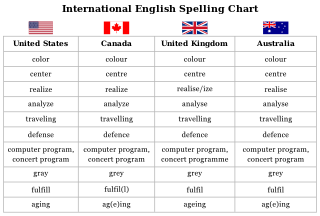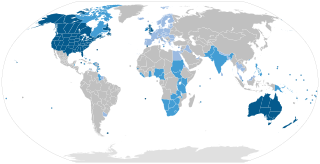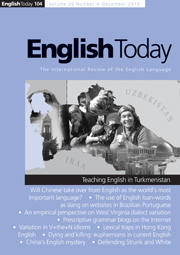
Arthur Asher Miller was an American playwright, essayist and screenwriter in the 20th-century American theater. Among his most popular plays are All My Sons (1947), Death of a Salesman (1949), The Crucible (1953), and A View from the Bridge (1955). He wrote several screenplays and was most noted for his work on The Misfits (1961). The drama Death of a Salesman is considered one of the best American plays of the 20th century.

British English is, according to Oxford Dictionaries, "English as used in Great Britain, as distinct from that used elsewhere". More narrowly, it can refer specifically to the English language in England, or, more broadly, to the collective dialects of English throughout the British Isles taken as a single umbrella variety, for instance additionally incorporating Scottish English, Welsh English, and Northern Irish English. Tom McArthur in the Oxford Guide to World English acknowledges that British English shares "all the ambiguities and tensions [with] the word 'British' and as a result can be used and interpreted in two ways, more broadly or more narrowly, within a range of blurring and ambiguity".

The use of the English language in current and former member countries of the Commonwealth of Nations was largely inherited from British colonisation, with some exceptions. English serves as the medium of inter-Commonwealth relations.
International English is the concept of using the English language as a global means of communication similar to an international auxiliary language, and often refers to the movement towards an international standard for the language. Related and sometimes synonymous terms include: Global English, World English, Common English, Continental English, General English, Engas, and Globish. Sometimes, these terms refer to the actuality of the situation, where English is spoken and used in numerous dialects around the world. These terms may acknowledge the diversity and varieties of English spoken throughout the world.

King Arthur is a legendary king of Britain, and a central figure in the medieval literary tradition known as the Matter of Britain. In Welsh sources, Arthur is portrayed as a leader of the post-Roman Britons in battles against Anglo-Saxon invaders of Britain in the late 5th and early 6th centuries. He first appears in two early medieval historical sources, the Annales Cambriae and the Historia Brittonum, but these date to 300 years after he is supposed to have lived, and most historians who study the period do not consider him a historical figure. His name also occurs in early Welsh poetic sources such as Y Gododdin. The character developed through Welsh mythology, appearing either as a great warrior defending Britain from human and supernatural enemies or as a magical figure of folklore, sometimes associated with the Welsh otherworld Annwn.

The Society for Psychical Research (SPR) is a nonprofit organisation in the United Kingdom. Its stated purpose is to understand events and abilities commonly described as psychic or paranormal. It describes itself as the "first society to conduct organised scholarly research into human experiences that challenge contemporary scientific models." It does not, however, since its inception in 1882, hold any corporate opinions: SPR members assert a variety of beliefs with regard to the nature of the phenomena studied.

Cambridge University Press is the university press of the University of Cambridge. Granted letters patent by King Henry VIII in 1534, it is the oldest university press in the world. It is also the King's Printer.
African-American English is the set of English sociolects spoken by most Black people in the United States and many in Canada; most commonly, it refers to a dialect continuum ranging from African-American Vernacular English to a more standard American English. Like other widely spoken languages, African-American English shows variation stylistically, generationally, geographically, in rural versus urban characteristics, in vernacular versus standard registers, etc. There has been a significant body of African-American literature and oral tradition for centuries.
International scientific vocabulary (ISV) comprises scientific and specialized words whose language of origin may or may not be certain, but which are in current use in several modern languages.
Scottish English is the set of varieties of the English language spoken in Scotland. The transregional, standardised variety is called Scottish Standard English or Standard Scottish English (SSE). Scottish Standard English may be defined as "the characteristic speech of the professional class [in Scotland] and the accepted norm in schools". IETF language tag for "Scottish Standard English" is en-scotland.
Sir Geoffrey Rudolph Elton was a German-born British political and constitutional historian, specialising in the Tudor period. He taught at Clare College, Cambridge, and was the Regius Professor of Modern History there from 1983 to 1988.

The Anglo-Frisian languages are the Anglic and Frisian varieties of the West Germanic languages.
Frederic Michael Raphael is an American-British BAFTA and Academy Award winning screenwriter, biographer, nonfiction writer, novelist and journalist.
World Englishes is a term for emerging localised or indigenised varieties of English, especially varieties that have developed in territories influenced by the United Kingdom or the United States. The study of World Englishes consists of identifying varieties of English used in diverse sociolinguistic contexts globally and analyzing how sociolinguistic histories, multicultural backgrounds and contexts of function influence the use of English in different regions of the world.

English is a West Germanic language in the Indo-European language family, with its earliest forms spoken by the inhabitants of early medieval England. It is named after the Angles, one of the ancient Germanic peoples that migrated to the island of Great Britain. Existing on a dialect continuum with Scots and then most closely related to the Low Saxon and Frisian languages, Modern English is genealogically Germanic. However, its vocabulary also shows major influences from French and Latin, plus some grammar and a small amount of core vocabulary influenced by Old Norse. Speakers of English are called Anglophones.
British Catholic History is a biannual peer-reviewed academic journal published by Cambridge University Press on behalf of the Catholic Record Society. In its early years it was known as Biographical Studies of English Catholics, and then from 1959 to 2015 as Recusant History.
Ghanaian Pidgin English (GhaPE), is a Ghanaian English-lexifier pidgin also known as Pidgin, Broken English, and Kru English. GhaPE is a regional variety of West African Pidgin English spoken in Ghana, predominantly in the southern capital, Accra, and surrounding towns. It is confined to a smaller section of society than other West African creoles, and is more stigmatized, perhaps due to the importance of Twi, an Akan dialect, often spoken as lingua franca. Other languages spoken as lingua franca in Ghana are Standard Ghanaian English (SGE) and Akan. GhaPE cannot be considered a creole as it has no L1 speakers.
Robin Fleming is a medieval historian, professor of history at Boston College, and a 2013 MacArthur Fellow. She has written several books focusing on the people of Roman Britain and early medieval Britain, using both archaeological evidence and written records.
Tom McArthur was a Scottish linguist, lexicographer, and the founding editor of English Today. Among the many books he wrote and edited, he is best known for the Longman Lexicon of Contemporary English, the first thematic monolingual learner's dictionary, which complemented the Longman Dictionary of Contemporary English by bringing together sets of words with related meanings, Worlds of Reference, as well as the Oxford Guide to World English.

The Faculty of English is a constituent part of the University of Cambridge. It was founded in 1914 as a Tripos within the Faculty of Medieval and Modern Languages. It could be studied only as a 'Part I' of a degree course, alongside a 'Part II' either in medieval languages or from another Tripos. In 1926, the course became a distinct Faculty.









